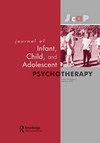Lenses and Mirrors: Reflecting on Dyadic Psychotherapy, Supervision, and Research with Families Involved in the Child Welfare System
Q3 Psychology
Journal of Infant, Child, and Adolescent Psychotherapy
Pub Date : 2021-10-02
DOI:10.1080/15289168.2021.2006484
引用次数: 2
Abstract
ABSTRACT Historically, services for families in the child welfare system have been behaviorally and externally focused, rather than attuning to what is happening on the inside for parents and children. Rarely do families have access to psychodynamic treatment provided by highly trained and well supported therapists. The Building Blocks program was developed at New Alternatives to Children, a child welfare agency, to provide mentalization-based psychodynamic treatment to families with children in foster care or at risk of being removed from the home. This paper presents data from a case of a mother and her infant daughter, observed through three lenses – clinical observation, research and supervision – sharpening our understanding of factors that facilitate trust, healing and attachment within both parent-child and therapeutic relationships. To empirically evaluate the Building Blocks program, families participate in assessments at baseline and after 12 sessions. We observed meaningful changes in this dyad’s verbal and nonverbal behaviors, based on Coding Interactive Behavior System, confirming the clinical observations. Finally, reflective supervision supported positive movement, and the use of video aided therapist mentalization. Integration of clinical training and research can provide a more comprehensive view of clinical work and allow families to be more fully seen and known.透镜与镜子:对涉及儿童福利制度的家庭的二元心理治疗、监督和研究的反思
从历史上看,儿童福利系统中的家庭服务一直以行为和外部为重点,而不是协调父母和儿童内部发生的事情。很少有家庭能够获得训练有素、支持良好的治疗师提供的心理动力学治疗。“积木”项目由儿童福利机构“儿童新选择”(New Alternatives to Children)开发,旨在为有寄养儿童或有可能被带离家庭的儿童的家庭提供基于心理的心理动力学治疗。本文通过临床观察、研究和监督这三个角度,呈现了一位母亲和她的女婴的案例数据,加深了我们对在亲子关系和治疗关系中促进信任、治愈和依恋的因素的理解。为了经验性地评估构建模块项目,家庭在基线和12次会议后参与评估。基于编码交互行为系统,我们观察到这对夫妇的语言和非语言行为发生了有意义的变化,证实了临床观察。最后,反思性监督支持积极运动,并使用视频辅助治疗师心理化。将临床培训与研究相结合,可以提供更全面的临床工作视角,也可以让家庭得到更充分的认识和认识。
本文章由计算机程序翻译,如有差异,请以英文原文为准。
求助全文
约1分钟内获得全文
求助全文
来源期刊

Journal of Infant, Child, and Adolescent Psychotherapy
Psychology-Clinical Psychology
CiteScore
1.70
自引率
0.00%
发文量
37
 求助内容:
求助内容: 应助结果提醒方式:
应助结果提醒方式:


